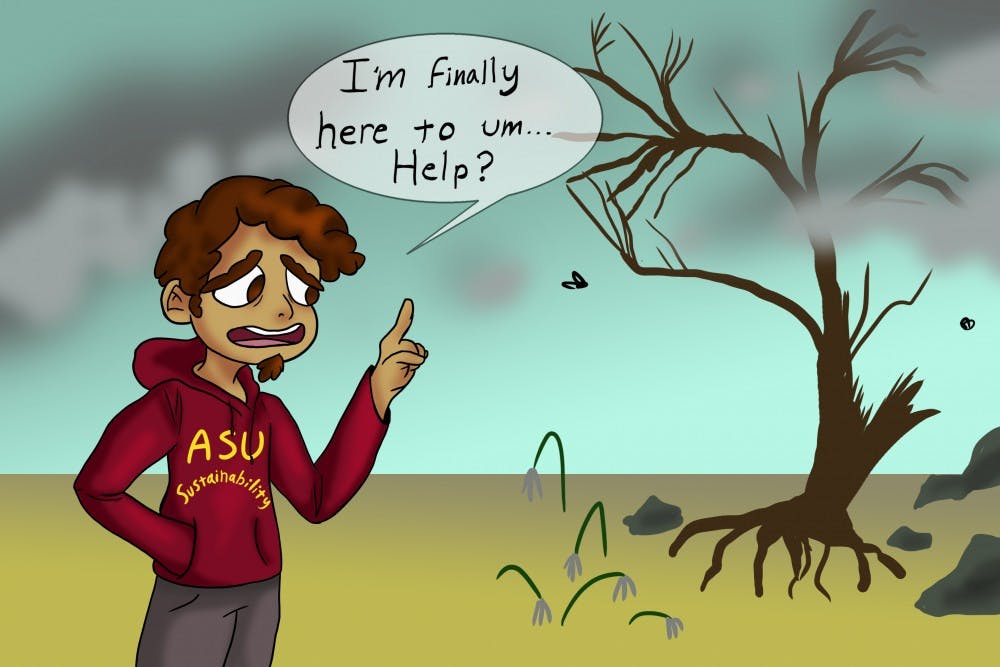With a new president in office, U.S. policy regarding climate change has changed drastically.
During his time in office, President Obama relayed to the American people that “no challenge poses a greater threat to our future” than climate change. In sharp contrast, President Trump has deemed climate change a hoax with promises to dismantle every one of Obama’s policies, which are aimed at addressing climate change and curbing the effects of global warming.
The concept of global warming was created by and for the Chinese in order to make U.S. manufacturing non-competitive.
— Donald J. Trump (@realDonaldTrump) November 6, 2012
Although these proposed policies do not bode well for the future of environmental stability and those who seek to improve it, they serve as an opportunity for individuals to critically think about our public policy regarding sustainability.
ASU established the nation’s first school of sustainability, which is aimed towards educating a new generation of student scholars to develop practical solutions to the world's most challenging sustainability issues.
With over 1,500 students enrolled in sustainability programs at ASU and undergraduate and graduate degree options in environmental ecology, ASU is one of the many universities leading the efforts in global sustainability initiatives.
While Trump’s policies are harmful to the preservation of notable environmental progress and organizations such as the Environmental Protection Agency, it is important to persevere in this time of great uncertainty.
Instead of adopting a complacent attitude towards the current administration's outlook on climate change and sustainability, students should continue to address these challenges because studying sustainability isn’t just about getting a job — it’s about educating others and creating innovative solutions to the world’s most pressing environmental issues.
Sonja Klinsky, senior sustainability scientist and assistant professor at the ASU School of Sustainability, wants students to get involved in sustainability initiatives now.
“Instead of taking a passive role towards the current political climate regarding sustainability and climate change, students should get involved in local organizations now," Klinsky said. "Take every opportunity available to you and actively pursue what you are passionate about now. The earlier you can start, the better."
These initiatives set forth by the White House Administration should remind us that we still have a long way to go to solve significant sustainability issues.
It's easy to feel discouraged in this time of uncertainty, but students should use this as an opportunity for reflection. It’s time to re-engage ourselves in conversation and problem solving regarding our view on environmental stability.
Climate change and global warming are not things that can be fixed over night by one person. Instead, we should learn to positively impact the environment in our own small ways.
Rob Melnick, senior sustainability scientist and executive director of the ASU School of Sustainability, believes that the reality of climate change and environmental challenges are going to happen whether the budget is cut by the president or not.
“The budget cuts and elimination of research and prevention programs proposed by the White House will not change the fact that the climate is warming, people will get over the initial shock of these propositions and realize that they will have to step up and deal with the problems on their own,” Melnick said.
He also noted that although these policies will make sustainability efforts harder to maintain, businesses and cities not affected by the budget cuts will have to step up and deal with the problems that affect them.
But the most frightening aspect of all this is that the White House has sent a message to the rest of the world that they don’t believe climate change is a serious issue.
Many scientists in the U.S say they are watching the Trump administration’s new policies regarding climate change with deep concern.
Whether you believe in it or not, facts are facts and it’s impossible to negate their seriousness without coming off as ill-informed. Rising global temperatures have been recorded in the past several years resulting in drastic changes in the weather and climate around the globe.
The evidence is clear, and we can't let politics cloud our judgement regarding something backed by the scientific community.
Regardless of whether or not you’re a sustainability major or in a sustainability driven profession, you need to ask yourself, what resources, skills and interests do I have that I can contribute to making our earth a better place?
The current administration's views on climate change should serve as a wake-up call to all of us. We should use it as a point of reflection and ask ourselves what we want the future of our planet to look like.
Positive contributions to the global sustainability initiative aren’t just limited to sustainability professionals — there are opportunities in every field to get involved. Over the course of our life, we can all agree to commit to sustainability in a variety of different ways as citizens, employees and students.
Reach the columnist at yasmine.mian@asu.edu or follow @yasminemian on Twitter.
Editor’s note: The opinions presented in this column are the author’s and do not imply any endorsement from The State Press or its editors.
Want to join the conversation? Send an email to opiniondesk.statepress@gmail.com. Keep letters under 500 words and be sure to include your university affiliation. Anonymity will not be granted.
Like The State Press on Facebook and follow @statepress on Twitter.




